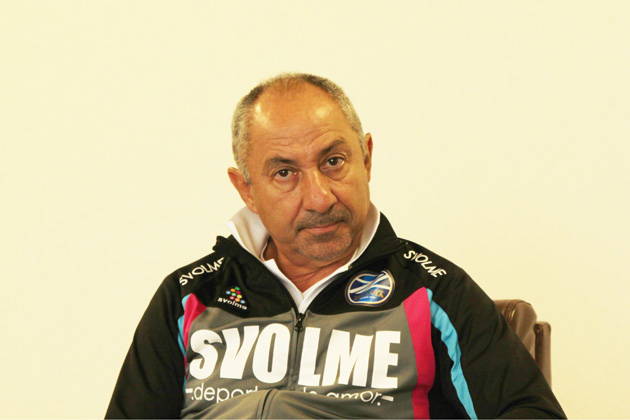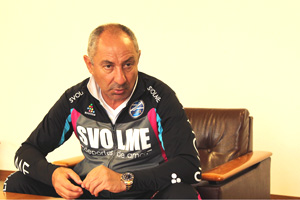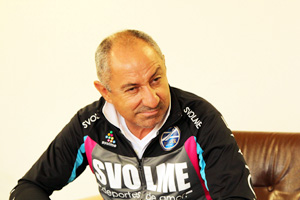
FC Machida Zelvia Manager Osvaldo Ardiles paints a picture of the past and future of Machida and Japan.
Starting this year, new manager Oswald Ardiles will be leading FC Machida Zelvia, the club that recently received a long-sought promotion to the J-League. Standing at the forefront of soccer since his playing days, Ardiles has taught and directed athletes all over the world. From the viewpoint of a man who understands the world of soccer, what does the future hold for FC Machida Zelvia and soccer in Japan?
JAPANTWO(JP2):It’s been about three months since you began leading FC Machida. Do you feel that your policies and tactics have been hitting home with the team?
Oswald Ardiles (Ardiles):I am very content with my life in Japan. Being part of this club is extremely enjoyable, and the environment is just how I had imagined. However, this doesn’t mean that I am truly happy. What I am missing right now are results. The relationship between the club and the players is great, as is the atmosphere here. On one hand, the players are all giving more than 100 percent, and have been improving in both playing style and how to carry through a game, but on the other hand, we are still lacking in results.
“By leaving good results, it is possible to achieve great harmony within the club and the whole town.”
JP2:From seeing the team during practice, I got the strong impression that you all get along well with each other. Are you consciously implementing ways to improve the team’s atmosphere and relationships between players?
Ardiles:It is very important to form good bonds between players. Ever since I was a player I have tried to promote team harmony. Even more than just the small team, I picture the whole club in perfect harmony. I believe that this concept originates from Japan. What I’m talking about requires the staff, the players of course, the club workers, the owner, supporters, and the people of Machida to all be on the same page. To promote an even larger harmony, I think we need to be seeing better and better results. As for myself, I have a passion to see this club grow to new heights. One of our goals for the future is to see the team be promoted to the J-League division one, but time in between is important. In order to scale a mountain, you have to take the first step.
JP2:For someone who has acted as manager for numerous clubs, what made you decide to lead FC Machida Zelvia?
Ardiles: I accepted the offer to manage this team with great enthusiasm. For me, there is significance in coming to Japan. Also, I think that it will be a challenge for me. However, I’m finding it difficult to express through words what I truly feel. Soccer is my life. When I was 15 or 16, I started playing professional soccer. I’ve always been connected to the sport some way or another, so it would be very difficult to remove soccer from my life. When I’m not directing, I still want to be there. So, when I received the invitation, I accepted without a second thought. I don’t regret my decision in the least.

JP2:What do you think of the hometown activities that F.C. Machida Zelvia is participating in, such as children playing soccer with the players after home games?
Ardiles: As you’ve mentioned, I have been part of many clubs over the years, but in my opinion this club takes first place for its efforts to root itself in the region they represent through activities such as this. With that being said, Machida is a very unique place. With the other clubs, I started as manager after the teams had risen to a certain status. With Machida, they rose to the J-league the same year that I arrived. In other words, they are still a very young team. This will make it quite a challenge, but I wholeheartedly approve of activities like school visits that allow for personal contact between the children of this region and the team.
JP2:You mentioned that one of FC Machida Zelvia’s strong features is being community-based, but what other strengths does the club have, and in what areas?
Ardiles:Of course, I believe that being so closely connected with the city of Machida is an important part. Instead of each member of this club moving independent of each other, our supports, players and workers moving together in harmony is what’s important, and I am well aware of this.
JP2:After leading the Shimizu S-Pulse club in 1996 and being immersed in Japanese soccer, what sort of changes do you feel have taken place in the world of soccer in Japan?
Ardiles:First off, I believe that the J-League has brought about a big change. Before the league was established, Japan’s presence in the world of international soccer was scarcely felt. The opening of the J-League has resulted in many talented players coming forward and being noticed. I think that you can thank the J-League for the raising up of excellent players such as Nakata, Nakamura, Honda, and Kagawa. Also, in these last few years Japan has made continual appearances in the world cup series. In the past, Japan’s teams experienced losses by wide margins, but that has since disappeared. That being said, I believe that the J-League holds significant meaning, and can be credited for bringing about these successes.
JP2:How would you classify Japan’s current world-class status?
Ardiles:I would say that Japan has risen to a level just below elite countries such as Spain, France, Italy, and Brazil. It’s the next step from here that will be the most difficult.
“Whether or not soccer culture will take root in Japanese soil is a very difficult topic.”

JP2:If we were to compare Japan with the elite countries you mentioned, I get the impression that soccer culture is not as ingrained in us as it is in those countries. What do you feel is necessary to further promote soccer to Japanese people?
Ardiles:Although the J-League has brought soccer to the national level, what you say is true; soccer culture has not been completely accepted yet. Comparing past and present, it is the irrefutable truth that soccer as a culture has changed dramatically since the start of the J-League; however, I just do not know whether or not Japan will allow soccer culture to become as powerful as it is in other countries. The reason is because for that to happen, a multitude of other factors outside of soccer are involved. The very idea that culture will take root with other factors involved is difficult to think about. However, if we stop thinking of those various factors and focus solely on soccer, I believe that playing spectacular games and showing our great plays will become factors that will draw more people toward soccer. Nonetheless, whether or not this has any direct correlation with soccer culture has become a difficult topic to think about. It is the same as comparing soccer and baseball. In addition, Japan has a long history of sumo wrestlers; it is impossible to say how far soccer would go if it replaced sumo or any other sport.
“For Japan to enter the world of soccer elites, a certain Je ne sais quoi is needed.”
JP2:What developments would you like to see happen for FC Machida Zelvia, and for the world of Japanese soccer?
Ardiles:First and foremost, I am thinking of Machida. The first thing that needs to happen is our survival during this year, and we need to become a monolith to do so. Once that has been achieved, we can strive for the J1 league. I think that it will be impossible to achieve this if we are away from this area called Machida. In regards to Japan, I think in order for Japan to be entered into the world of elites, it must strive to be something unique, and make progress after overcoming the J-League. Soccer in Japan has had such rapid development that I can only describe as spectacular. However, that growth has currently levelled off a bit. It will be even more difficult now to make any momentous progress. To enter that world of elites from where we are will require that certain “something” to make it happen.
JP2:Could you give me a clue as to what you mean by “something”?
Ardiles:There is a definite need to create something new. What I am trying to say is something like the establishment of the J-League. I don’t mean just recruiting high-salary players from around the world like at the original opening. I can’t say exactly what this “something” is, but it might be beneficial to have new structure. However, that doesn’t mean that we necessarily have to return to the past. Due to the fact that there are currently no high level players in the J-League that have reached world-top status, it is essential that we seek out a high quality of play in order to enter the ranks of the elite. To achieve this, I fear that substantial funds are required. Just like a spiral, more money will bring more talented players, resulting in increased game quality, and this will bring more spectators to watch.
Oswald Ardiles Manager of FC Machida Zelvia
Born August 3rd, 1952 in Argentina. Brought home a victory in 1978 as a representative of Argentina, went on to participate in the Spain tournament and twice in the FIFA World Cup in 1982, and continued to be an active player until 1991. Started his career as a manager in 1989 while playing for Swindon Town (England), managed Japan’s Shimizu S-Pulse from 1996 to 1998, Yokohama F Marinos from 1999 to 2001, and Tokyo Verdy 1969 from 2003 to 2005. Began managing FC Machida Zelvia in 2012.
Website http://www.zelvia.co.jp
